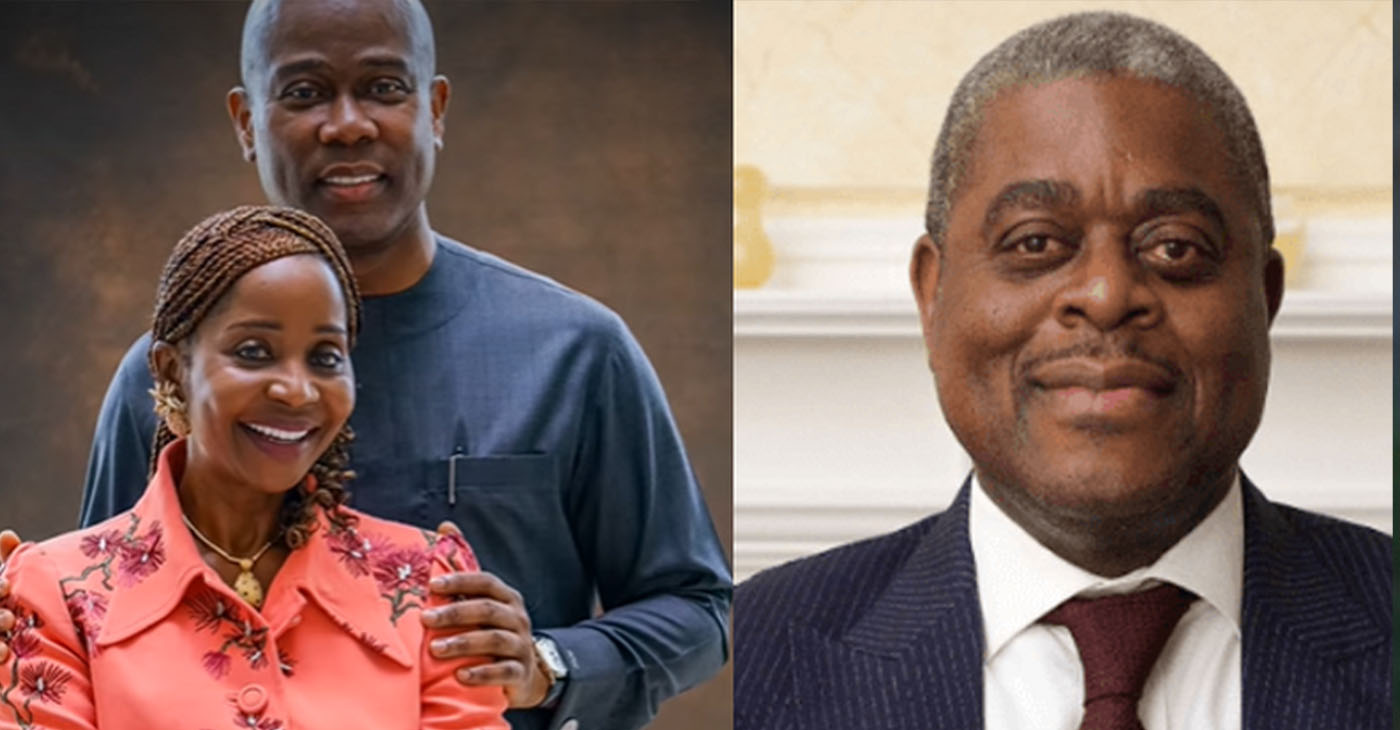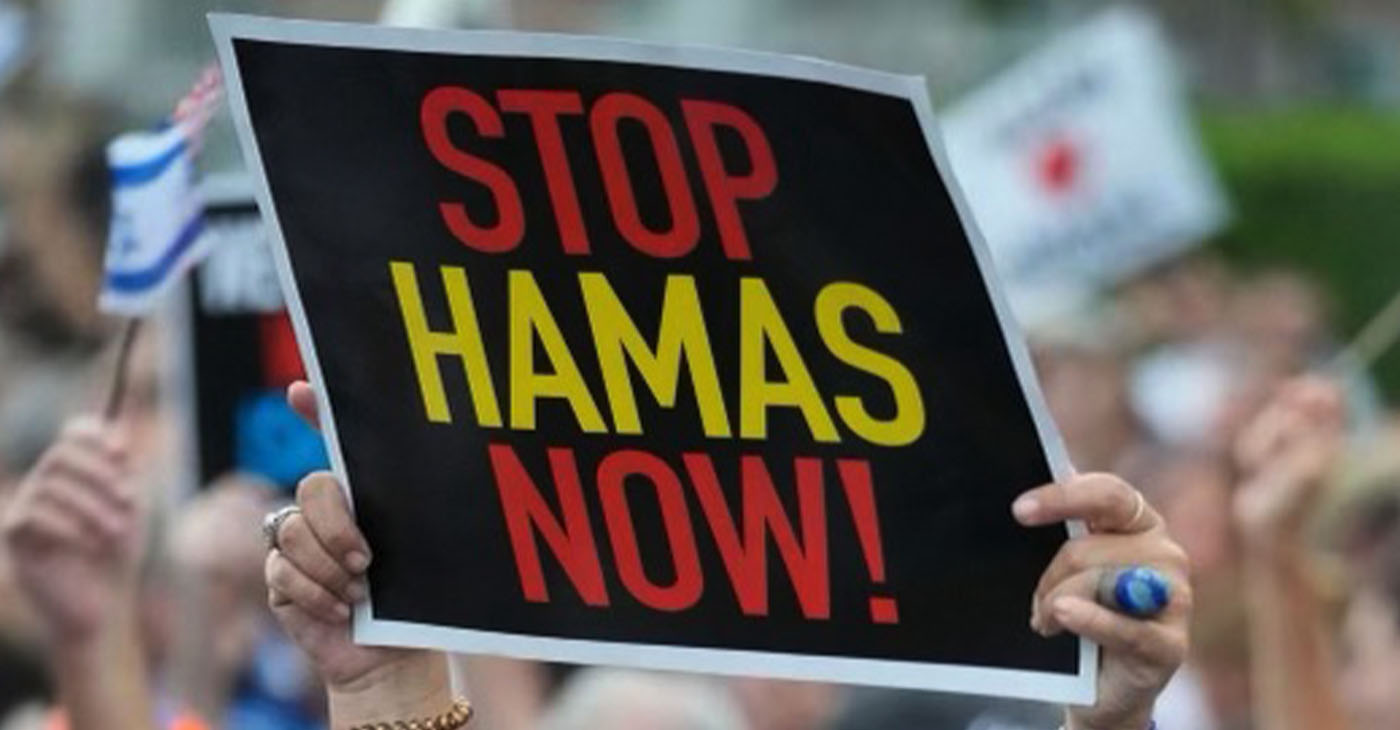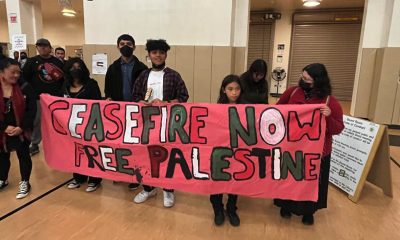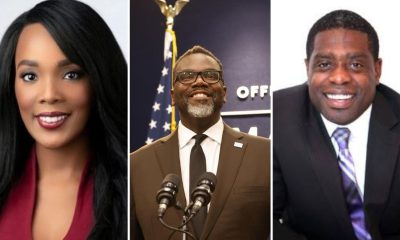World
Malaysia: Human Traffickers’ Camps Had 139 Suspected Graves

A Malaysian Forensic team personnel carries bags of human remains found at the abandoned camps from the Malaysia-Thailand border in Wang Kelian, Malaysia Monday, May 25, 2015. (AP Photo/Joshua Paul)
Eileen Ng, ASSOCIATED PRESS
WANG KELIAN, Malaysia (AP) — Malaysian authorities said Monday a cluster of abandoned jungle camps used by human traffickers contained 139 suspected graves as well as barbed-wire pens likely used to cage migrants, shedding more light on a regional trade that preyed on some of Southeast Asia’s most desperate people.
National police chief Khalid Abu Bakar said forensics experts were exhuming the suspected graves found at 28 vacated camps in the hilly jungle area on the border with Thailand where trafficking syndicates were known to operate.
“It is a very sad scene,” Khalid told reporters at a police outpost in the town of Wang Kelian several kilometers (miles) from the camps, one of which appeared large enough to hold about 300 people. “I am shocked. We never expected this kind of cruelty.”
At one forest camp, police found several parts of a decomposed body inside a wooden pen. The parts were placed into white bags and brought to Wang Kelian, and district police chief Rizani Ismail said they would be examined by forensics experts. Police said they would begin digging up other suspected graves — mounds of earth, covered with leaves and marked by sticks — on Tuesday.
“We have discovered 139 of what we believe to be graves,” Khalid said. “We believe they are victims of human trafficking.”
Prime Minister Najib Razak, in Tokyo on an official visit, vowed to find the perpetrators. “I am deeply concerned with graves found on Malaysian soil purportedly connected to people smuggling. We will find those responsible,” he said on Twitter early Monday.
The finding in the northern Malaysian state of Perlis follows a similar discovery earlier this month by police in Thailand who unearthed dozens of bodies from shallow graves on the Thai side of the border. Thai police Maj. Gen. Puthichart Ekkachan said 36 bodies had been found there in seven abandoned camps.
The discoveries have exposed hidden networks of jungle camps run by human smugglers, who have for years held countless desperate people captive while extorting ransoms from their families. Most of those who have fallen victim to the trafficking networks are members of Myanmar’s persecuted Rohingya Muslim community or impoverished migrants from Bangladesh, part of a wave of people who have fled their homelands to reach countries like Malaysia, where they hope to find work or live freely.
As Southeast Asian governments have launched crackdowns in recent weeks amid intensified international pressure and media scrutiny, traffickers have abandoned camps on land and boats at sea to avoid arrest.
Khalid said at least two of the camps found in Malaysia appeared to have been abandoned within the past few weeks, based on the condition of items left behind such as vegetables, rice and almost new cooking utensils. Scattered personal possessions included a pink teddy bear and white children’s sandals, he said, indicating the possible presence of children at the camp.
On three large whiteboards, police pasted dozens of pictures taken at the camps, which ranged in size, with the largest capable of holding about 300 people and smaller ones just a few dozen. Some of the pictures showed large, crudely built pens made from wooden sticks and barbed wire that were believed to be used as cages.
“We think the migrants were imprisoned in these wooden pens,” Khalid said. “They were not allowed to move freely and traffickers kept watch at sentry posts.”
Other items left behind included a rifle pouch, used bullets and bullet casings, he said. Police also found white muslin cloth, used by Muslims in Malaysia to wrap dead bodies, and a wooden stretcher believed to have carried bodies.
The findings were the result of an operation Malaysian authorities conducted from May 11-23, during which they combed the steep jungle area along 50 kilometers (30 miles) of the border with Thailand. Due to the difficult terrain, Khalid said the investigation and forensics analysis could take a few weeks.
Human rights groups and activists say the area on the Thai-Malaysia border has been used for years to smuggle migrants and refugees, including Rohingya Muslims, a long-persecuted minority in predominantly Buddhist Myanmar.
In many cases, they pay human smugglers thousands of dollars for passage, but are instead held for weeks or months, while traffickers extort more money from their families back home. Rights groups say some have been beaten to death, and The Associated Press has documented other cases in which people have been enslaved on fishing boats.
Since May 10 alone, more than 3,600 people — about half of them from Bangladesh and half Rohingya from Myanmar — have landed ashore in Indonesia,Malaysia and Thailand. Thousands more are believed to be trapped at sea in boats abandoned by their captains.
Malaysia and Indonesia announced last week that they would provide temporary shelter for up to one year for migrants recently found or still stranded at sea. The U.S. has said it will settle some of them permanently.
The Rohingya, numbering around 1.3 million in Myanmar, have been called one of the most persecuted minorities in the world. Long denied basic rights, they have been driven from their homes in mob attacks in Myanmar’s Rakhine state several times since 2012.
More than 140,000 were displaced and are now living under apartheid-like conditions in crowded camps. More than 100,000 others have fled by sea.
___
Associated Press writers Thanyarat Doksone, Jocelyn Gecker and Todd Pitman in Bangkok contributed to this report.
Copyright 2015 The Associated Press. All rights reserved. This material may not be published, broadcast, rewritten or redistributed.
###
Barbara Lee
Congresswoman Barbara Lee Issues Statement on Deaths of Humanitarian Aid Volunteers in Gaza
On April 2, a day after an Israeli airstrike erroneously killed seven employees of World Central Kitchen (WCK), a humanitarian organization delivering aid in the Gaza Strip, a statement was release by Rep. Barbara Lee (D-CA-12). “This is a devastating and avoidable tragedy. My prayers go to the families and loved ones of the selfless members of the World Central Kitchen team whose lives were lost,” said Lee.

By California Black Media
On April 2, a day after an Israeli airstrike erroneously killed seven employees of World Central Kitchen (WCK), a humanitarian organization delivering aid in the Gaza Strip, a statement was release by Rep. Barbara Lee (D-CA-12).
“This is a devastating and avoidable tragedy. My prayers go to the families and loved ones of the selfless members of the World Central Kitchen team whose lives were lost,” said Lee.
The same day, it was confirmed by the organization that the humanitarian aid volunteers were killed in a strike carried out by Israel Defense Forces (IDF). Prior to the incident, members of the team had been travelling in two armored vehicles marked with the WCF logo and they had been coordinating their movements with the IDF. The group had successfully delivered 10 tons of humanitarian food in a deconflicted zone when its convoy was struck.
“This is not only an attack against WCK. This is an attack on humanitarian organizations showing up in the direst situations where food is being used as a weapon of war. This is unforgivable,” said Erin Gore, chief executive officer of World Central Kitchen.
The seven victims included a U.S. citizen as well as others from Australia, Poland, the United Kingdom, Canada, and Palestine.
Lee has been a vocal advocate for a ceasefire in Gaza and has supported actions by President Joe Biden to airdrop humanitarian aid in the area.
“Far too many civilians have lost their lives as a result of Benjamin Netanyahu’s reprehensible military offensive. The U.S. must join with our allies and demand an immediate, permanent ceasefire – it’s long overdue,” Lee said.
Bay Area
Nigerian Bank Chief Killed in Helicopter Crash on Way to Superbowl XVIII
According to the San Bernardino County Sheriff’s Dept., the crash occurred near Nipton, on the edge of the Mojave Desert Preserve. The poor weather conditions — rain, wind and snow showers—may have contributed to the accident, although the investigation is not complete. All six aboard were killed. Herbert Wigwe, 57, founded Access Bank in 1989, and it became the country’s largest competitor, Diamond Bank in 2018.

By Post Staff
The co-founder of one of Nigeria’s largest banks died with his wife, son and three others when the helicopter transporting them from Palm Springs, Ca., to Boulder City, Nev. to attend the fifty-eighth SuperBowl at the stadium outside Las Vegas crashed on Feb. 9.
According to the San Bernardino County Sheriff’s Dept., the crash occurred near Nipton, on the edge of the Mojave Desert Preserve. The poor weather conditions — rain, wind and snow showers—may have contributed to the accident, although the investigation is not complete. All six aboard were killed
Herbert Wigwe, 57, founded Access Bank in 1989, and it became the country’s largest competitor, Diamond Bank in 2018.
More recently, Wigwe was planning to open a banking service in Asia this year after making successful expansions to other parts of Africa, including South Africa, Kenya, and Botswana.
Nigerian President Bola Tinubu described Wigwe’s death as an ‘overwhelming tragedy.”
Oakland resident and Nigerian immigrant Kayode Gbadebo agrees with Tinubu. He met Wigwe in Nigeria but crossed paths with him in London in 2006. Wigwe, he said, “took risks.”
He was young and people thought he couldn’t do what he intended, which was not so much about money but community.
“He was more like Jesus in washing the feet of the poor– Wigwe was culturizing community,” Gbadebo said.
“There will never be another like him. This is a deep, deep loss” and he hopes everyone will eventually “be comforted.”
He was also disappointed that a replacement has already been named even before Wigwe is buried. “It is not reasonable. You don’t want a vacuum, but it’s” not fair to the family, Gbadebo observed.
Wigwe had also been working to solve the migration issues from African countries, believing that “investing in higher education was key to controlling mass migration, which “is destabilising countries across the world,” BBC News reported.
“We need to take a holistic approach to address global migration, starting with our traditional framework for international development,” Wigwe wrote.
To that end, according to BBC News, Wigwe was preparing to open Wigwe University in Niger, where he was from.
“The best place to limit migration is not in the middle of the Mediterranean or the English Channel or the Rio Grande. It is in the home countries that so many migrants are so desperate to leave,” he wrote, saying his university was an opportunity for him “to give back to society.”
Besides Wigwe and his wife, Chizoba Nwuba Wigwe, and one son, two crew members and Bimbo Ogunbanjo, former group chairman of the Nigerian Exchange Group Plc, were also killed in the crash.
According to Wikipedia, three other children survive Wigwe.
In his statement reported in People magazine, Tinubu described Wigwe as “a distinguished banker, humanitarian, and entrepreneur.”
“I pray for the peaceful repose of the departed and ask God Almighty to comfort the multitude of Nigerians who are grieving and the families of the deceased at this deeply agonizing moment,” the president said.
He added, “Their passing is an overwhelming tragedy that is shocking beyond comprehension.”
Besides feeling the tremendous loss, Gbadebo fears the disorder and greed that will follow. “It’s a mess,” he said.
People magazine, BBC News and Wikipedia were the sources for this report.
Activism
No Valid Reason for Failing to Condemn Hamas’ Act of Terrorism
On Oct. 7, 2023, Hamas terrorists crossed the Israel-Gaza border and indiscriminately slaughtered Israeli civilians in their homes. They killed nearly 300 young people at a music festival and took at least 200 hostages including 30 children. The atrocities they committed included massacres of families, abduction of the elderly and children, burning of babies and rapes of women.

By Joe W. Bowers Jr.
California Black Media
OPINION
On Oct. 7, 2023, Hamas terrorists crossed the Israel-Gaza border and indiscriminately slaughtered Israeli civilians in their homes.
They killed nearly 300 young people at a music festival and took at least 200 hostages including 30 children. The atrocities they committed included massacres of families, abduction of the elderly and children, burning of babies and rapes of women.
The horrific surprise attack deserves universal and unequivocal condemnation. President Joe Biden called what Hamas did “an act of sheer evil” and pledged to defend the lives of Israelis and Jewish Americans.
He said, “Let there be no doubt. The United States has Israel’s back. We’ll make sure the Jewish and democratic state of Israel can defend itself today, tomorrow, as we always have.”
Hamas killed approximately 1,400 people including 32 Americans. Citizens from 40 different countries including the United Kingdom, France, Mexico, and Thailand were killed or reported missing.
Hamas fighters breached Israel’s border defenses on the final day of Sukkot while soldiers were away due to the holiday and launched attacks on 22 towns outside the Gaza Strip. This security lapse has been described as a catastrophic failure of Israel’s intelligence agencies..
Hamas is an extremist Islamist militant organization that has governed the Gaza Strip since 2007. It is recognized as an Iranian-backed terrorist group by the U.S. and the European Union and has a long history of violence against Jews and Palestinians, the latter of whom they often use as human shields.
While there have been plenty of groups who have unequivocally condemned the massacres, there are a number who haven’t, including organizations such as the Democratic Socialists of America (DSA), Black Alliance for Peace, Red Nation, and independent Black Lives Matter (BLM) chapters (excluding the national Black Lives Matter Global Network Foundation).
The DSA San Francisco chapter put out a statement on Oct. 9 that said, “Socialists support the Palestinian people’s, and all people’s, right to resist and fight for their own liberation. This weekend’s events are no different.”
Student organizations at a number of universities and colleges in California signed a solidarity statement titled “Resistance Uprising in Gaza” from Students for Justice in Palestine (SJP). The statement attributes the violence of the Hamas attack to what it refers to as Israeli apartheid and occupation.
The SJP statement written by Bears for Palestine at UC Berkeley says, “We support the resistance, we support the liberation movement, and we indisputably support the Uprising.” Essentially, these students are indirectly associating themselves with Hamas’ barbaric acts under the guise of “resistance.”
Signing the statement were 51 student organizations including those from Stanford, UC Berkeley, UCLA, UC Davis, UC San Diego, CSU Sacramento, and USC.
A statement signed by 34 Harvard student organizations said, “We, the undersigned student organizations, hold the Israeli regime entirely responsible for all unfolding violence.”
Many university leaders, where these students are enrolled, have been guilty of failing to unequivocally condemn Hamas and for inadequately addressing their students’ expressed support for Hamas.
Several Stanford faculty members, including three Nobel laureates, condemned Stanford’s administrators’ weak response to acts of terrorism and the expression of pro-Hamas sentiments by students on campus.
Israel unilaterally withdrew from Gaza in 2005. It dismantled 21 Israeli settlements in the territory and handed them over to the Palestinian Authority.
The assault by Hamas on Oct. 7 was not an ordinary clash with Israel. Hamas’ actions resulted in the deadliest single day for Jews since the Holocaust.
While there are valid reasons for protesting Israel’s treatment of Palestinians and a real reckoning with the Israeli government on its policies is long overdue, nothing justifies Hamas’ attack.
Israelis who were killed largely had nothing to do with the conditions of Palestinians in Gaza. Some of the victims weren’t even Israeli — they were just tourists.
The students blaming Israel for the atrocities committed by Hamas have faced criticism. Some groups have withdrawn their endorsements because of the backlash aimed at them. Others have doubled down on their activism. SJP held a “National Day of Resistance” on several campuses.
Several CEOs have asked Harvard to disclose a list of members from the organizations assigning responsibility to Israel to insure they do not hire any of their members. A Berkeley law professor has also urged firms not to hire his students who have publicly blamed Israel for the war.
This California Black Media report was supported in whole or in part by funding provided by the State of California, administered by the California State Library.
-

 Activism3 weeks ago
Activism3 weeks agoOakland Post: Week of March 27 – April 2, 2024
-

 #NNPA BlackPress4 weeks ago
#NNPA BlackPress4 weeks agoCOMMENTARY: D.C. Crime Bill Fails to Address Root Causes of Violence and Incarceration
-

 #NNPA BlackPress4 weeks ago
#NNPA BlackPress4 weeks agoFrom Raids to Revelations: The Dark Turn in Sean ‘Diddy’ Combs’ Saga
-

 #NNPA BlackPress4 weeks ago
#NNPA BlackPress4 weeks agoCOMMENTARY: Lady Day and The Lights!
-

 #NNPA BlackPress4 weeks ago
#NNPA BlackPress4 weeks agoMayor, City Council President React to May 31 Closing of Birmingham-Southern College
-

 #NNPA BlackPress4 weeks ago
#NNPA BlackPress4 weeks agoBaltimore Key Bridge Catastrophe: A City’s Heartbreak and a Nation’s Alarm
-

 #NNPA BlackPress4 weeks ago
#NNPA BlackPress4 weeks agoBaltimore’s Key Bridge Struck by Ship, Collapses into Water
-

 #NNPA BlackPress3 weeks ago
#NNPA BlackPress3 weeks agoBeloved Actor and Activist Louis Cameron Gossett Jr. Dies at 87





















































